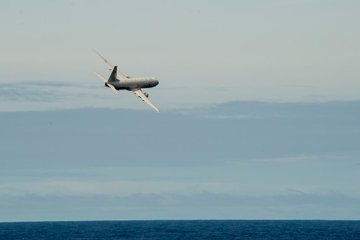A United States Navy surveillance aircraft was targeted with a military-grade laser by a Chinese naval vessel while flying over the Philippine Sea, the Navy reported.
Navy officials from the U.S. Pacific Fleet first acknowledged the incident in a Friday statement, blaming a Chinese naval destroyer for the “unsafe and unprofessional” firing of the laser.
According to the Navy, the P-8A Poseidon was conducting a patrol in international airspace, above international waters roughly 380 miles west of Guam, on Feb. 17 when it was targeted by People’s Republic of China navy destroyer 161.
“The PRC navy destroyer’s actions were unsafe and unprofessional,” the Navy statement reported. “Weapons-grade lasers could potentially cause serious harm to aircrew and mariners, as well as ship and aircraft systems.”
People’s Liberation Army Navy destroyer lased a #USNavy P-8A Poseidon aircraft in an unsafe, unprofessional manner. The incident took place Feb. 17 in the airspace above international waters 380 miles west of Guam. #FreeandOpenIndoPacific
Read More: navy.mil/submit/display…
254 people are talking about this
Not visible to the naked eye, the military-grade laser fired on the aircraft was reportedly picked up by on-board sensors.
According to CNN, similar lasers, colloquially referred to as “dazzlers,” have the power illuminate aircraft cockpits and cabins at long range, potentially blinding pilots for a time.
As a result, Navy officials said, such action is in violation of several regional naval safety and engagement agreements.
The Feb. 17 incident was not, however, the first time Chinese military forces have been suspected of antagonizing U.S. military craft.
As tensions have risen between the two world powers over the past decade, numerous naval stand-offs have been reported and the U.S. military indicated in 2018 that the People’s Liberation Army was responsible for another high-profile laser incident off the African coastal nation of Djibouti.
That incident, which involved multiple lasers being fired at a patrolling C-130 aircraft, left two American service members with minor eye injuries, DefenseNews reported.
The U.S. filed a formal diplomatic complaint, known as a démarche, with the Chinese government in light of the incident, but Chinese officials from both the Foreign and Defense Ministries categorically denied the allegations.
Personnel at China's military base in Djibouti have been aiming powerful lasers at American aircraft that also operate in or near the country. The lasers caused minor eye injuries to 2 American pilots, an official said. nyti.ms/2KyLEmJ
142 people are talking about this
A démarche is expected to be issued in the recent case as well, unnamed U.S. Department of Defense officials told CNN.
No material damage or service personnel injuries have been reported in light of the Feb. 17 incident.
Deployed to Kadena Air Force Base in Okinawa, Japan, from its home base in Jacksonville, Florida, the targeted squadron currently “conducts routine operations, maritime patrol and reconnaissance in the U.S. 7th Fleet area of operations.”
And with a lengthy history of operations within the region, the Navy assured this recent incident will not serve to hinder further patrols from the Pacific Fleet.
“U.S. 7th Fleet is the largest numbered fleet in the world, and with the help of 35 other maritime-nation allies and partners, the U.S. Navy has operated in the Indo-Pacific region for more than a century, providing credible, ready forces to help preserve peace and prevent conflict,” the Navy’s statement declared.
“U.S. Navy aircraft and ships will continue to fly, sail and operate anywhere international law allows.”






No comments:
Post a Comment